Hyundai Bayon vs Suzuki S-Cross - Differences and prices compared
Costs and Efficiency:
When it comes to price and running costs, the biggest differences usually appear. This is often where you see which car fits your budget better in the long run.
Hyundai Bayon has a slight advantage in terms of price – it starts at 20100 £, while the Suzuki S-Cross costs 21800 £. That’s a price difference of around 1705 £.
Fuel consumption also shows a difference: Suzuki S-Cross manages with 5.30 L and is therefore slight more efficient than the Hyundai Bayon with 5.40 L. The difference is about 0.10 L per 100 km.
Engine and Performance:
Power, torque and acceleration are the classic benchmarks for car enthusiasts – and here, some clear differences start to show.
When it comes to engine power, the Suzuki S-Cross has a barely noticeable edge – offering 110 HP compared to 100 HP. That’s roughly 10 HP more horsepower.
In terms of top speed, the Suzuki S-Cross performs slight better – reaching 185 km/h, while the Hyundai Bayon tops out at 179 km/h. The difference is around 6 km/h.
There’s also a difference in torque: Suzuki S-Cross pulls somewhat stronger with 235 Nm compared to 200 Nm. That’s about 35 Nm difference.
Space and Everyday Use:
Cabin size, boot volume and payload all play a role in everyday practicality. Here, comfort and flexibility make the difference.
Seats: offers more seating capacity – vs .
In curb weight, Hyundai Bayon is slight lighter – 1170 kg compared to 1280 kg. The difference is around 110 kg.
In terms of boot space, the Suzuki S-Cross offers hardly perceptible more room – 430 L compared to 411 L. That’s a difference of about 19 L.
In maximum load capacity, the Suzuki S-Cross performs slight better – up to 1230 L, which is about 25 L more than the Hyundai Bayon.
When it comes to payload, Hyundai Bayon slightly takes the win – 465 kg compared to 405 kg. That’s a difference of about 60 kg.
Who wins the race?
The Suzuki S-Cross proves to be wins the duel decisively and therefore becomes our DriveDuel Champion!
Suzuki S-Cross is the better all-rounder in this comparison.
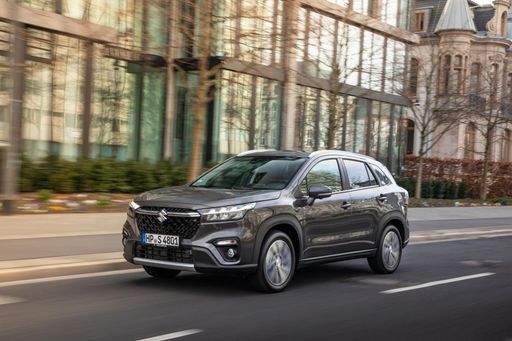 @ Suzuki Motor Corporation
@ Suzuki Motor Corporation
Suzuki S-Cross
Costs and Consumption
View detailed analysis
Engine and Performance
View detailed analysis
Dimensions and Body
View detailed analysis
Hyundai Bayon
The Hyundai Bayon slips neatly between city runabout and small SUV, offering surprising practicality and a fresh, confident design that stands out in urban traffic. It's an easy buy for shoppers who want smart packaging, tidy handling and a dash of personality without fuss — a sensible little crossover that makes everyday driving a bit more enjoyable.
details @ Hyundai Motor Company
@ Hyundai Motor Company
 @ Hyundai Motor Company
@ Hyundai Motor Company
 @ Hyundai Motor Company
@ Hyundai Motor Company
 @ Hyundai Motor Company
@ Hyundai Motor Company
 @ Hyundai Motor Company
@ Hyundai Motor Company
Suzuki S-Cross
The Suzuki S-Cross is a neatly packaged crossover that puts everyday practicality ahead of showy theatrics, offering a comfortable cabin and predictable handling that suit family life and weekend errands alike. It’s not a headline-grabber, but its sensible packaging, low-key charm and reputation for reliability make it a shrewd choice for buyers who prefer smart value over flash.
details @ Suzuki Motor Corporation
@ Suzuki Motor Corporation
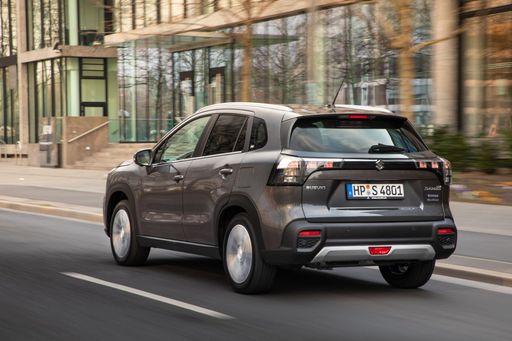 @ Suzuki Motor Corporation
@ Suzuki Motor Corporation
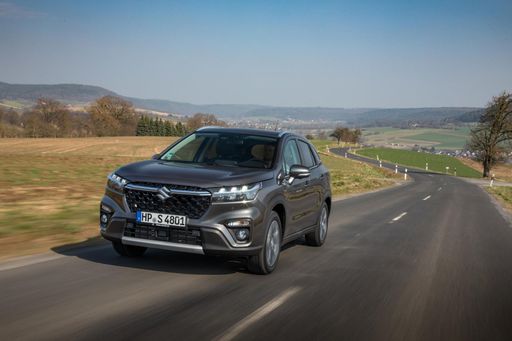 @ Suzuki Motor Corporation
@ Suzuki Motor Corporation
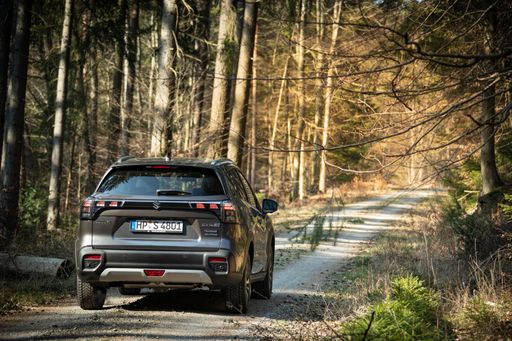 @ Suzuki Motor Corporation
@ Suzuki Motor Corporation
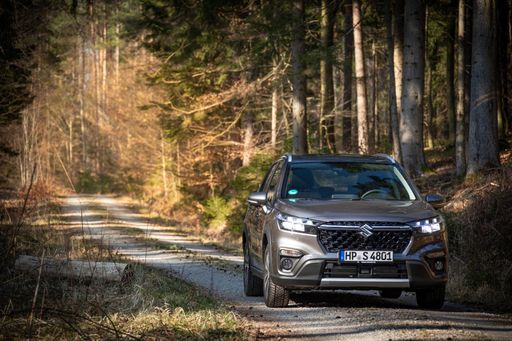 @ Suzuki Motor Corporation
@ Suzuki Motor Corporation
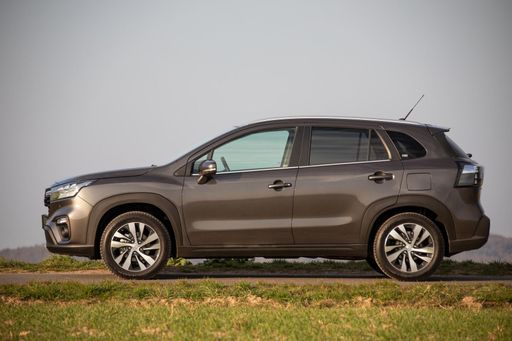 @ Suzuki Motor Corporation
@ Suzuki Motor Corporation
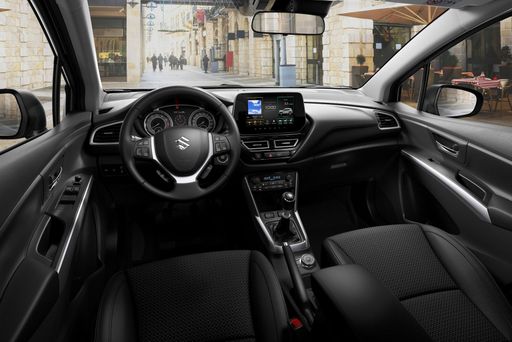 @ Suzuki Motor Corporation
@ Suzuki Motor Corporation
 @ Hyundai Motor Company
@ Hyundai Motor Company
|
 @ Suzuki Motor Corporation
@ Suzuki Motor Corporation
|
|
|
|
Costs and Consumption |
|
|---|---|
|
Price
20100 - 25800 £
|
Price
21800 - 34200 £
|
|
Consumption L/100km
5.4 - 5.5 L
|
Consumption L/100km
5.3 - 5.8 L
|
|
Consumption kWh/100km
-
|
Consumption kWh/100km
-
|
|
Electric Range
-
|
Electric Range
-
|
|
Battery Capacity
-
|
Battery Capacity
-
|
|
co2
124 g/km
|
co2
119 - 138 g/km
|
|
Fuel tank capacity
40 L
|
Fuel tank capacity
47 L
|
Dimensions and Body |
|
|---|---|
|
Body Type
SUV
|
Body Type
SUV
|
|
Seats
5
|
Seats
5
|
|
Doors
5
|
Doors
5
|
|
Curb weight
1170 - 1195 kg
|
Curb weight
1280 - 1385 kg
|
|
Trunk capacity
411 L
|
Trunk capacity
430 L
|
|
Length
4180 mm
|
Length
4305 mm
|
|
Width
1775 mm
|
Width
1785 mm
|
|
Height
1500 mm
|
Height
1580 mm
|
|
Max trunk capacity
1205 L
|
Max trunk capacity
1230 L
|
|
Payload
460 - 465 kg
|
Payload
395 - 405 kg
|
Engine and Performance |
|
|---|---|
|
Engine Type
Petrol
|
Engine Type
Petrol MHEV
|
|
Transmission
Manuel, Automatic
|
Transmission
Manuel, Automatic
|
|
Transmission Detail
Manual Gearbox, Dual-Clutch Automatic
|
Transmission Detail
Manual Gearbox, Automatic Gearbox
|
|
Drive Type
Front-Wheel Drive
|
Drive Type
Front-Wheel Drive, All-Wheel Drive
|
|
Power HP
100 HP
|
Power HP
110 HP
|
|
Acceleration 0-100km/h
11.3 - 12.4 s
|
Acceleration 0-100km/h
-
|
|
Max Speed
176 - 179 km/h
|
Max Speed
180 - 185 km/h
|
|
Torque
172 - 200 Nm
|
Torque
235 Nm
|
|
Number of Cylinders
3
|
Number of Cylinders
4
|
|
Power kW
74 kW
|
Power kW
81 kW
|
|
Engine capacity
998 cm3
|
Engine capacity
1373 cm3
|
General |
|
|---|---|
|
Model Year
2024
|
Model Year
2025
|
|
CO2 Efficiency Class
D
|
CO2 Efficiency Class
D, E
|
|
Brand
Hyundai
|
Brand
Suzuki
|
What drivetrain options does the Hyundai Bayon have?
The Hyundai Bayon is available as Front-Wheel Drive.
The prices and data displayed are estimates based on German list prices and may vary by country. This information is not legally binding.
